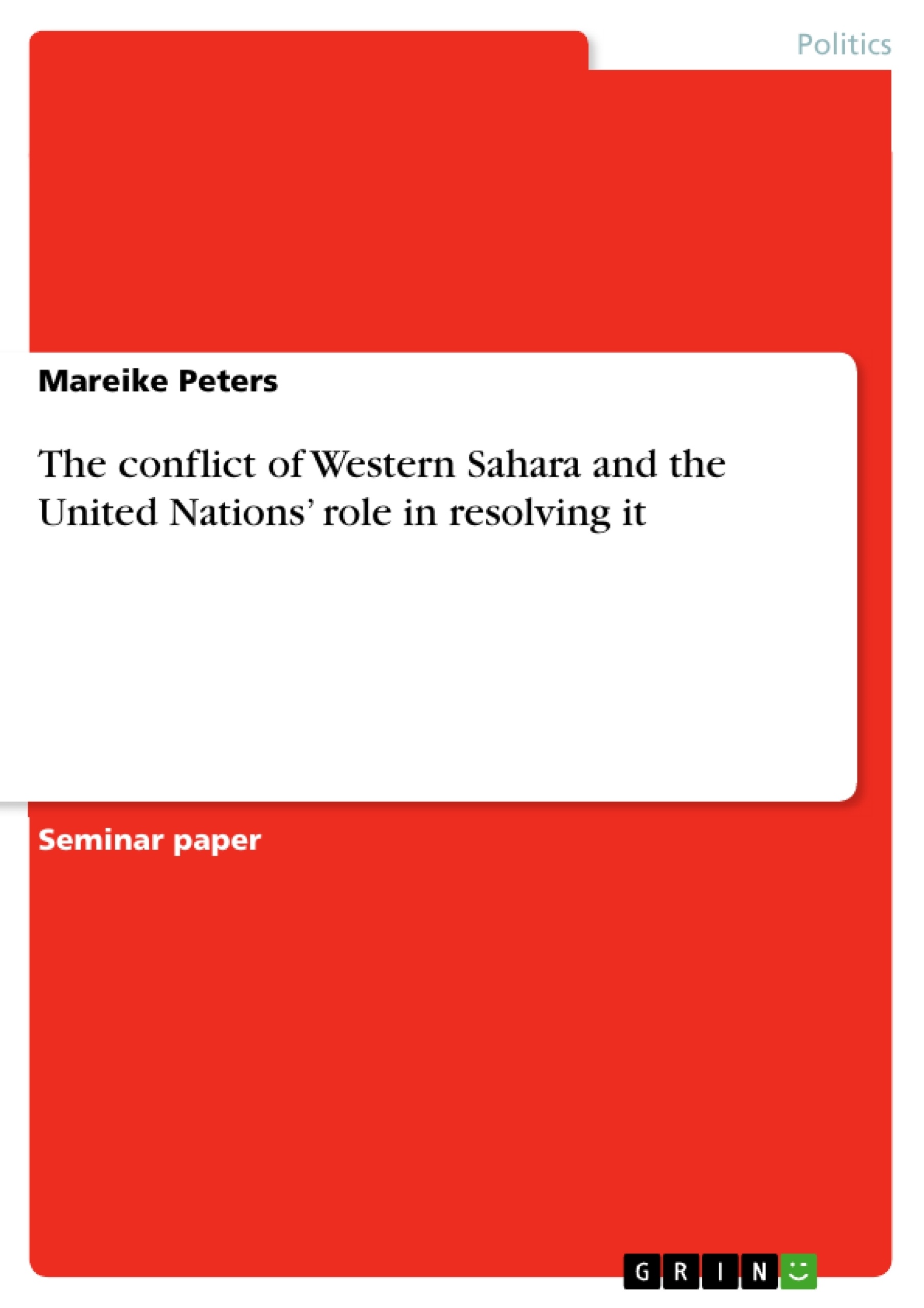This paper deals with the question why the international community turns a blind eye to the Western Sahara conflict. Moreover, why do the United Nations fail to implement measures to resolve the conflict between Morocco and the people of the Western Sahara?
The Western Sahara conflict can be added to the list of the most ambivalent conflicts in recent history. Morocco occupied the African country in 1976 and since then the population of the former Spanish colony is fighting for self-determination while living as refugees in the desert of Algeria. The United Nations acknowledged that the country belongs to the people of Western Sahara. Consequently, the Moroccan occupation is
illegal, especially regarding international law. However, no
change or progress has been made; all negotiation attempts have failed. Hence, the conflict could be seen as intractable.
Inhaltsverzeichnis (Table of Contents)
- Introduction
- Theoretical framework
- Intractable conflicts
- The conflict of the Western Sahara
- Historical outline of the conflict
- Western Sahara – an intractable conflict?
- The role of the United Nations in the conflict
- Critiques of the UN attempts of resolving the conflict
- Conclusion
- References
Zielsetzung und Themenschwerpunkte (Objectives and Key Themes)
This term paper examines the conflict of Western Sahara, focusing on its intractable nature and the role of the United Nations in resolving it. The paper aims to analyze the historical context of the conflict, evaluate the United Nations' efforts, and understand the challenges that have hindered a peaceful resolution.
- Intractability of the Western Sahara conflict
- The role of the United Nations in conflict resolution
- Critiques of the UN's attempts to resolve the Western Sahara conflict
- Factors contributing to the conflict's intractability
- International law and the Moroccan occupation of Western Sahara
Zusammenfassung der Kapitel (Chapter Summaries)
The introduction presents the Western Sahara conflict as a protracted and complex situation, highlighting the ongoing struggle for self-determination and the Moroccan occupation's impact. It introduces the core question of why the international community and the United Nations have failed to resolve the conflict. The theoretical framework lays out the concept of intractable conflicts, defining them as complex and difficult to resolve, often characterized by deep-rooted historical grievances, irreconcilable moral differences, and a lack of effective third-party intervention. Chapter three delves into the historical roots of the Western Sahara conflict, tracing its origins to Spanish colonialism and the subsequent occupation by Morocco. It explores the factors contributing to the conflict's intractability, including the contested nature of Western Sahara's status and the presence of powerful actors with conflicting interests.
Schlüsselwörter (Keywords)
The main keywords and focus topics of this paper are: Western Sahara, conflict resolution, intractable conflicts, United Nations, international law, Moroccan occupation, self-determination, refugees, historical outline, and critiques of the UN's role.
Frequently Asked Questions
What is the core of the Western Sahara conflict?
The conflict involves the struggle of the Sahrawi people for self-determination against the Moroccan occupation of the territory since 1976.
Why is the conflict considered "intractable"?
It is characterized by deep-rooted historical grievances, irreconcilable differences over sovereignty, and the failure of numerous international negotiation attempts.
What is the United Nations' role in Western Sahara?
The UN acknowledges the right to self-determination and considers the occupation illegal, yet it has faced criticism for failing to implement a lasting resolution.
What is the legal status of Western Sahara?
Under international law, Western Sahara is a non-self-governing territory, and the Moroccan presence is widely viewed as an illegal occupation.
Where do the Sahrawi refugees live?
A large portion of the Sahrawi population lives in refugee camps in the desert of Algeria, awaiting a political solution.
- Arbeit zitieren
- Mareike Peters (Autor:in), 2016, The conflict of Western Sahara and the United Nations’ role in resolving it, München, GRIN Verlag, https://www.grin.com/document/317591



